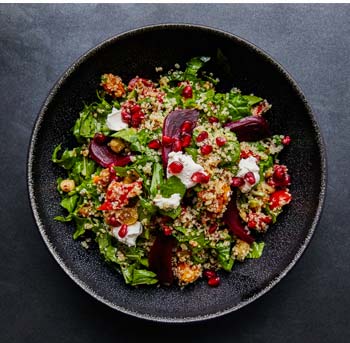Stoma, colostomy & ileostomy diet advice
Giving stoma or colostomy diet advice can be difficult because there are multiple types of stoma and sometimes people need to adjust their diet after bowel surgery, in the short term or for longer.
Furthermore, not everyone with a stoma needs to change their diet after colon surgery or bowel surgery.
This guide has been designed to give diet advice for stoma users with helpful hints and tips, but it is always best to discuss with your Doctor, Specialist Nurse, or a Registered Dietitian before making dietary changes.

Foods to Avoid with a Stoma
Some people find that caffeinated drinks such as coffee, tea and cola-style drinks can overstimulate their bowel and cause foods to pass more quickly through the digestive system.
Moderate to heavily-spiced foods are also common irritants to a sensitive bowel. Some people have gut-sensitivity to ‘rich’ meals that are high in fat. Choosing lower fat options or having smaller portions of these foods can help reduce symptoms and improve digestion.
Our first piece of advice is always to ask your stoma care nurse what is best for you. He or she can explain which foods to avoid with an ostomy and recommend the best foods and specific stoma diet recipes.
The second piece of stoma diet advice is to let your stoma settle and then to just try small portions of each food and see what effect they have.
If you’d like more information on foods to avoid with a stoma, sign up to Ostomates Kitchen for free here. Once you sign up you will also get some stoma diet recipes and meal ideas for stoma patients.
Low-Fibre Diet
The normal recommended ‘healthy diet’ is high-fibre, low-salt, and low-fat. However, this may not be the ideal diet for stoma users.
The gut can be extra sensitive within the first 6-8 weeks after surgery. A sensitive gut or bladder is more likely to be irritated which can mean food and fluid passing through the body quicker than normal; this can cause:
- Cramping
- Bloating
- Amore liquid stool
- Higher production of urine
Following a low-fibre or low-residue diet after surgery may help reduce these symptoms. However, there is no strong clinical evidence that a low-fibre diet is needed long-term in those with urostomies, colostomies or even ileostomies.
If you are experiencing any of these symptoms after surgery, you can try swapping high-fibre foods to low-fibre alternatives.
For example, swapping wholemeal bread for white bread, and brown pasta and rice to white pasta and rice, will help to reduce your fibre intake. Also swapping fibrous, stringy fruit such as rhubarb, pineapple, figs, and dates with peeled or skinless soft fruits such as strawberries, bananas, and melon.
For a complete list of low-fibre foods and low-fibre diet menu examples sign up to Ostomates Kitchen here.
